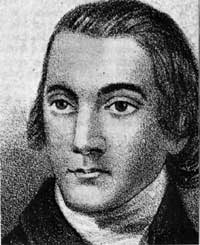Lyman Hall
Lyman Hall (born April 12, 1724 in Wallingford , Colony of Connecticut , colony of the Kingdom of Great Britain , today USA ; † October 19, 1790 on his plantation near Shell Bluff, Burke County , Georgia , USA) signed the US Declaration of Independence as Georgia's representative and is thus one of the founding fathers of the USA .
Life
Hall was the son of John Hall and Mary Street. He had good connections at a time when kinship was a priority: his paternal grandfather, John Hall (1670–1730), was a member of the Board of Governors and a judge on the Colony's Supreme Court. His maternal grandfather was Reverend Samuel Street (Harvard 1664), Wallingford's first pastor.
Hall graduated from Yale College in 1747 and studied with his uncle Reverend Samuel Hall (1695-1776; Yale 1716) in Cheshire, Connecticut . In 1749 he was appointed to the pulpit of Stratfielder Parish (now Bridgeport, Connecticut) . His pastorate was heated: an outspoken group of parishioners opposed his calling; In 1751 he was released on charges of his moral character which, according to a biography, were "supported by evidence and his own confession". He continued preaching for two more years as an assistant in vacant pulpits while studying medicine and education. In 1752 he married Abigail Burr of Fairfield, who died the following year. In 1757 he was remarried, moved to South Carolina and settled as a doctor in Dorchester, near Charleston , a community that had been started a few decades earlier by immigrants from Massachusetts . When these immigrants moved to the Midway District - now Liberty County - in Georgia, Dr. Hall on them. He soon became one of the leading citizens in the newly formed town of Sunbury.
politics
On the eve of the American independence movement , St. John's Congregation in Sunbury was a hotbed of radical sentiment. Although Georgia was not initially represented in the Continental Congress , Hall's influence convinced the congregation to send a delegate to Philadelphia - Hall himself. He received a seat in Congress in March 1775, which he held until 1780. He was one of three Georgians who signed the US Declaration of Independence.
In January 1779, Sunbury was burned down by the British. Hall's family fled north, where they stayed until the British withdrew in 1782. Hall returned to Georgia and settled in Savannah . In January 1783 he was elected governor of the state - and remained so for a year. After his tenure ended, he returned to his doctor's office.
In 1790, Hall moved to a plantation in Burke County on the Carolina border, where he died at the age of 67. Hall's widow, Mary Osborn, died in November 1793. His son John also died soon after, leaving no children behind. Hall County is named after Lyman Hall. His native Wallingford honored Lyman Hall by naming one of his two high schools after him.
swell
- Franklin B. Dexter: Lyman Hall. In: Biographical sketches of the graduates of Yale College, 1745–1763. Henry Holt & Company, New York 1896.
- Charles S. Hall: Hall ancestry. GP Putnam's Sons, New York 1896.
Web links
- Lyman Hall in the Biographical Directory of the United States Congress (English)
- Lyman Hall in the National Governors Association (English)
- Lyman Hall in the database of Find a Grave (English)
| personal data | |
|---|---|
| SURNAME | Hall, Lyman |
| BRIEF DESCRIPTION | American politician |
| DATE OF BIRTH | April 12, 1724 |
| PLACE OF BIRTH | Wallingford , Connecticut |
| DATE OF DEATH | October 19, 1790 |
| Place of death | Shell Bluff, Burke County , Georgia |


